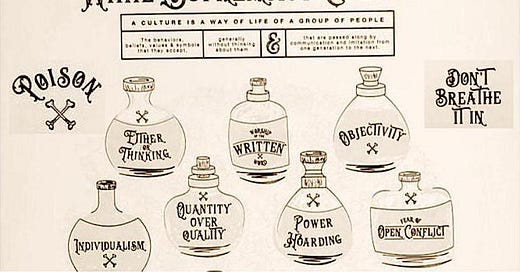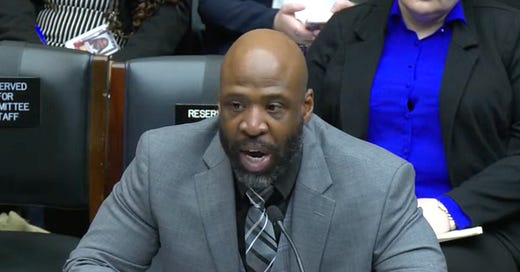
Soapbox
TURNING THE PAGE ON WOKENESS
Retire the word and focus on ideas
Rienard Knight-Laurie
Wokeness is an apparition. Allegedly everywhere, but on closer examination nowhere to be found—certainly not in school curricula. It’s simultaneously brazen yet also underhanded, gaining traction but also somehow incredibly unpopular. Its apologists are right to question the often irreconcilable charges made against it. We can say for certain that laypeople don’t like it, if recent polls and electoral results are any indication. At the same time, among cosmopolitan elites it's seemingly manna from heaven. Book sales and speaking fees bear testimony to this. Corporate America appears to be down with the cause too, insofar as it doesn’t impact their bottom line.
Let’s be serious though: what exactly do we mean by “woke”? How about “a set of political ideals centered around social justice and allyship with disadvantaged groups”? To interrogate the value proposition of wokeness, let’s drill down on a single precept embraced by those who make challenging oppression the focus of their activism: “Persistent disparities between black and white Americans are caused by systems of oppression not solely found in history books, but acutely present today as well.” Of course, we’re constantly admonished to reckon with history at the same time as the policy prescriptions on offer and the issues of focus are centered around injustices inflicted in the present. That’s one way to conceive of America’s racial affliction, but there are others, of course. Imagine instead you think the story is more tragic than that—one far too complicated to be remedied by political intervention. What if you’re convinced that today racism is the exception, not the rule—that the racial disparities we find so vexing are for the most part echoes of the past?
Take, for instance, a lack of generational wealth among black Americans. This has historical oppression written all over it (slavery, Jim Crow, redlining, etc.). Sure, we can just give people stuff and watch disparity disappear, only to have the chasm return a decade or so later because the human and social capital required to retain and grow wealth are things we cannot endow. This isn’t a criticism of black people in particular. How many lottery winners, people given life-changing amounts of money, end up right back where they started in short order? This is only one facet, though.
How about the poor execution of school integration that left black students feeling like outsiders in white schools and fostered a culture of ambivalence among some toward education? They didn’t exactly roll out a welcome mat for Ruby Bridges. Children know when they’re not wanted and they find ways to cope. On top of that we can layer a welfare system that unwittingly incentivized single parenthood by economically penalizing families with live-in fathers. A common retort against this line of analysis is that in large measure these fathers are still heavily involved in their children’s day-to-day lives. Admittedly some are, but many are not. Regardless, it wasn’t necessary for this financial aid to serve as a substitute for a breadwinner; these systems could have been designed as supplements instead.
The elephant in the room, though, is law enforcement; as John McWhorter has taken to saying, “It’s the cops.” The American justice system failed black communities during the 20th century, counterintuitively through cycles of neglect and punitiveness, with blatant racism sprinkled on top for good measure (see James Forman, Jr.’s Locking Up Our Own). Countless studies show that it’s consistency in punishment which does the heavy lifting when it comes to deterrence; bringing the pain periodically doesn’t serve as an adequate substitute. Undermining confidence in the administration of justice sends the message to black communities that they’re on their own. Tragically, what comes to replace poor law enforcement policy is far worse.
Our urban centers are plagued by violence committed by a tiny segment of the population. A toxic culture of honor has entrenched itself among a subset of the population, oddly similar to elements of Appalachian Scotch-Irish honor culture (Thomas Sowell has suggested this as its genesis). Still, it has a strange logic in the absence of reliable justice and growth opportunities. Beyond that, there is an understandable “ressentiment” (Nietzsche’s term) among a subset of black Americans over historical atrocities that leads some to opt out of the systems that they stand to gain from. This is all very tragic and very understandable, given the history, but nevertheless not something to be solved by transactions or collective guilt, such as reparations.
I guess what I really mean by “wokeness” is being obsessed with slaying dragons in the present, while remaining oblivious to concepts like social and human capital that more aptly describe what the underprivileged really lack today. Financial capital, as in money transfers, are necessary, but insufficient to address the need. Aphorisms like Ta-Nehisi Coates’ “there’s nothing wrong with black people that the complete and total elimination of white supremacy would not fix” don’t address these problems at their core. I think his statement needs to be reconciled with an insight from Thomas Sowell—that it would be miraculous if centuries of bondage, racism, and oppression didn’t have a lasting impact on the people themselves. As Malcolm said, “If you stick a knife in my back nine inches and pull it out six inches, there's no progress.” We can’t forget that Malcolm addressed himself to antisocial elements of culture as well. Were he alive today I imagine he would see historical wounds there, too.
Are you convinced, even in part, by this more complicated version of the story?
In comparison, the “end systems of oppression” message has some built-in advantages. It’s much simpler: end racism. It costs almost nothing; the solutions primarily involve reaching into our souls, not our wallets. Moreover, the woke message doesn’t have the air of victim blaming. In contrast, Amy Wax’s parable of the pedestrian says that, while it’s not your fault you were run over by a marauding driver, ultimately it’s you who have to do the physical therapy to recover. No amount of compensation from others on its own will make you whole. The “end oppression” camp disagrees, and instead wants to institute a set of reforms in facets of society proximal to the disparate outcomes we all find so frustrating—ending “racist” gifted programs and standardized testing, for example. These are diagnostics: discarding them is like throwing out the thermometer because it’s telling you that you have a fever.
The flawed prescriptions of the woke don’t end there, however. Exorcising the racism of white Americans is a modern-day crusade. Laudable as this goal is, it centers on white people and ignores the very people we ought to be helping. Drawing parallels between horrible racist events in the past and unfortunate ones today is an exercise in revisionist history. It distorts the past and the present in one fell swoop.
Am I drawing a caricature? Will the woke folk please stand up? I’m convinced there is a constituency of true believers, but for those who are not woke but operate in the same circles, as long as the personal cost is low enough, why not adopt the message that’s less likely to land you in hot water? This is Havel’s greengrocer, more or less. We saw stark preference falsification during the New York mayoral election—people who, while faced with surging crime, publicly said they wanted fewer police in private voted as if they wanted the same number of police or more. Paint a bit of lamb’s blood over the door and hope death passes on by. Only the most disagreeable people are inclined to object publicly.
So, the answer is, we really don’t know how big the woke constituency on the left is. As long as the cost of calling the bluff is higher than continuing the charade, we won’t know the true composition of this faction. Ambiguity works in the service of the loudest voices, as everyone around them making the same mouth sounds is counted among their ranks.
Still, why care about the precise size of the woke congregation? Because, ultimately, it’s important to know what voters actually believe. The “motte and bailey” games aren’t serving any of our interests. The only people being truly transparent are the shameless partisans at both ends. When was the last time people trusted an election poll? Or an election result for that matter. Ultimately, for the political standoffs and logjams to end, we need to speak in terms of policy, not propaganda. Esoteric slogans like “black lives matter” and “defund the police” simply won’t do. Knowing who wants what, in explicit terms, not flowery language, and how large their constituencies are—that’s how we address problems like lack of opportunity. It doesn’t matter what we call each other. If we know what people actually agree on—a lot, to be frank—we can chart a path forward. The labels don’t serve our purposes, they obfuscate. So, I will do my best to retire “woke” from my vocabulary from now on, and instead ask people what exactly they believe.
In return, the people formerly known as “woke” need to cut it out with the witch hunts. I hope they understand by now that politics by inquisition is unsustainable. Eventually, the guillotine finds its way to you. As a description of a set of ideas, “wokeness” is somewhat serviceable. As a pejorative to bludgeon someone with, not so much. We shouldn’t be saddling people with our preconceptions, entering a conversation with the political equivalent of a facial recognition algorithm, trying desperately to match them to a preconceived archetype so we can decide whether or not to discard them. These are maps—let’s not confuse them with the terrain itself, especially when we’re surrounded by so much common ground.
Rienard Knight-Laurie is a former black nationalist turned transracial humanist. He has published on race eliminativism in Newsweek. He is a gourmet gourmand and has a BASc in mechanical engineering. Find him on Twitter.
















Loved your framing-especially this part at the end, "We shouldn’t be saddling people with our preconceptions, entering a conversation with the political equivalent of a facial recognition algorithm, trying desperately to match them to a preconceived archetype so we can decide whether or not to discard them. These are maps—let’s not confuse them with the terrain itself, especially when we’re surrounded by so much common ground."
Beautifully written!
This is truly thought-provoking, wise, and informative.
One slight critique I might offer is the characterization of "generational wealth" as being impacted by legacy systems of oppression. If, by that term, you mean per capita or per household or per worker wealth, then you might want to leave the word "generational" wealth out. If, by that term, you mean the accumulation of wealth over generations, then I would submit that until very recently (~the last 20 years) little to no wealth was transferred from one generation to the next. My family has been in the northeast since the 1630s one one side and the 1920s on the other. One side was certainly more well-off than the other, but neither parent started with any accumulated wealth from their parents. They bought a house for $12k in 1965 and did not start saving for retirement outside of pension until around 50 years of age. They were typical. The vast majority of wealth is generated by the people who hold it, not passed down. As you emphasize, it is the "human and social capital required to grow and retain wealth," that differs among groups of people. Efforts to close wealth gaps must therefore focus on human and social capital.